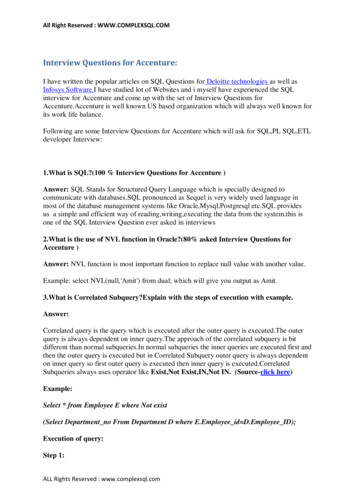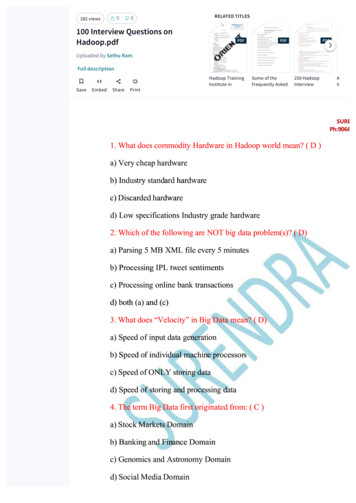
Transcription
The Interview ProcessThe job interview provides you and a prospective employer with the opportunity to discuss yourqualifications and determine if you are a good match for a position. You should always approachan interview in a business-like manner, which means research, preparation, and professionalismare essential. The purpose of the interview is not only for the interviewer to assess who you areand your qualifications, but also for you to assess whether the position and the company environment are a good fit for you - remember, this is your career.How to Prepare for Your InterviewPreparation is the key to successful interviewing.Whether you are interviewing for an internship, co-op,or full-time job, doing your research and preparingahead of time will help you make a good impressionand demonstrate your interest in the position. Youshould expect to spend at least 2 hours preparing foryour interview, and probably longer if you are seeking a full-time position. It is completely normal to feelnervous going into an interview, but being as preparedas possible will help you feel confident and do well.The Career Development Center (CDC) recommendsthat your preparation involves researching the following areas:THE COMPANYWHAT TO P REPA R EH O W TO P RE PAREKnow about the company with whom you are interviewing: What does the company do? What products or services does it provide? What industry is it in? Is it working on any new projects or initiatives? Has it been in the news recently? What is its reputation in the field? What makes it unique from its competitors? Why do you want to work for that company specifically?Sources: Company website News Company social media sites Annual Report Hoover’s Company Profiles Database (accessible throughGordon Library website under databases) Career Search Database (accessible through JobFinder) Gordon Library company information databases (search by subject) Alumni or personal connectionsTHE POSITIONWHAT TO P REPA R EH O W TO P RE PAREKnow about the job you are applying for: Prepare examples of how you have done each task ordisplayed each skill listed in the job description. Research anything you are not familiar with in the jobdescription. Be able to speak to which tasks excite you the most andwhich ones you want to learn more about.Research: Read the job description (tasks, qualifications, requirements). Look up anything with which you are not familiar.YOURSELFWHAT TO P REPA R EH O W TO P RE PAREKnow how to talk about yourself: Prepare a two-minute response to the question,“Tell me about yourself.” Make sure you can talk about everything on your resumeand how it relates to the job.Career experiences, and Know how to connect your education,skills back to the job.Development Be prepared to talk about yourstrengths and weaknesses.CenterResearch: Complete your resume. Be able to talk about your strengths, weaknesses, academicperformance, career interests, personal goals, work experience,special skills, and values.1
WHAT TO P REPA R EH O W TO P RE PAREKnow about the job you are applying for: Prepare examples of how you have done each task ordisplayed each skill listed in the job description. Research anything you are not familiar with in the jobdescription. Be able to speak to which tasks excite you the most andwhich ones you want to learn more about.Research: Read the job description (tasks, qualifications, requirements). Look up anything with which you are not familiar.The Interview ProcessYOURSELFWHAT TO P REPA R EH O W TO P RE PAREKnow how to talk about yourself: Prepare a two-minute response to the question,“Tell me about yourself.” Make sure you can talk about everything on your resumeand how it relates to the job. Know how to connect your education, experiences, andskills back to the job. Be prepared to talk about your strengths and weaknesses.Research: Complete your resume. Be able to talk about your strengths, weaknesses, academicperformance, career interests, personal goals, work experience,special skills, and values.The Day of Your Interview onsider company culture – some companiesChave a very casual dress code while others arevery formal. I t is best to be conservative – you should present resa professional image. This includes limitingcolorful/funky hairstyles, overly bold clothing, orexcessive body piercings/visible tattoos. Remember, it is always best to be overdressed than underdressed. aintain excellent personal hygiene – keepMyour nails trimmed and clean, wear deodorant, besure your hair is neat, check that your clothing isclean and wrinkle-free, and be sure you have freshbreath.When to ArriveYou should arrive at least 10-15 minutes early for yourappointment. Plan how you will get to the companyahead of time and test the route, if possible. On the dayof the interview, leave plenty of extra time to accountfor traffic and other unforeseen circumstances. If you arrive late, you set a poor first impression and could missthe opportunity to interview altogether if the interviewer has a schedule to maintain.What to Bring1.Extra copies of resume2.Reference list3.Supporting documents, such as a portfolio(if applicable)4.Questions prepared to ask the interviewer(at least 3-4)5.Directions to the interview6.Company contact name and phone numbers incase of an emergencyWhat to WearWHAT TO WEARS UGGE S TI ONS FOR M E N: Suits: dark color (gray, navy, black)Shirt: solid colorTie: conservative, not too bright/busy patternShoes: polished dress shoes (no boots)Socks: dark/matching socks (no white)Jewelry: no earrings – keep it simpleS UGGE S TI ONS FOR WOM E N:Some company representative will tell you what typeof dress is appropriate for the interview, but often theywill not. It is important for you to dress up. You don’t geta second chance to make a first impression.CareerDevelopmentCenter Suits/Dresses: solid or coordinating style, skirts kneelength or longer Blouses: nothing sheer or low cut Shoes: low heel, no boots Jewelry: simple, conservative Hair: neat and off your face Makeup: subtle2
The Interview ProcessHow to Prepare for an IQPInterviewInterview Guidelines:Make a Good ImpressionPrepare to answer several key questions:INTERVIEW GUIDELINESThe Site hat is your number one site? What others are youWopen to?11.Arrive early22.Dress conservatively and professionally33.Introduce yourself with a strong, confident handshake If you are sitting when you meet the interviewer,stand to shake their hand and make eye contact hy do you want to be at that site? Did you attendWinformation sessions? Make sure your handshake is firm and yourpalms are dry hat projects have been done in the past? WithWwhat organizations? Why are you interested?44.Maintain eye contact with the interviewer55.Speak in a clear tone of voice (not too quiet or toofast, and do not mumble)L ook up projects on WPI Library, find project reports, look for IQP and MQP reports66.Be alert, listen carefully, and maintain good posture.Always sit up straight77.Express a sincere interest in the position – showenthusiasm (even if it’s not your first choice)88.Demonstrate knowledge of the company (industry,products, services, etc.)The IQP hat preparation do you have for the IQP experiWence/project? What relevant skills do you have? hat do you hope to get out of your IQP experiWence?YouThe InterviewWhat Is the Interviewer Looking For?The interviewer is trying to determine two things:1. Whether you are qualified for the position (do youhave the right skills? experience? knowledge?) Who you are What are your strenghts (3) and weaknesses (1-2) What are your skills? L ist relevant experiences, academic performance,non-academic interests, and what you do in yourspare time (e.g., favorite books, movies, bands).Please note, this is not a complete list. These are just afew areas to begin thinking about.CareerDevelopmentCenter2. Whether your personality is a good fit for the company (are you likeable? a team player? will you fit inwith the team?)Types of Interview Questions Directed/Structured: consists of a list of specificquestions asked in order. They are commonly usedfor phone interviews, first-round screening interviews, and on-campus interviews3
The Interview Process on-directed/Unstructured: uses broad, openNended questions designed to make you “open up”and talk about yourself. They are more conversational than the directed interview and are commonly used for second-round on-site interviews. ehavioral: asks about specific situations fromByour past and how you acted in them. The approach is based on the premise that the best predictors of future performance are past actions. Theyare commonly infused into the two previous styles,though some interviews are strictly behavioral. tress/Technical: designed to put you under presSsure to see how you handle the situation. Questions are often test-like, such as solving a problem,drawing a diagram, or presenting on a topic. Purestress interviews are not common, but some stressquestions may be asked during other types, especially for positions in Computer Science, Electrical &Computer Engineering, and Consulting.If you are asked a technical question for which youdo not know the answer, do not panic. Try to thinkthrough the quesiton out loud so your interviewercan hear you, and ultimately admit that you do notknow the answer, but explain what resources youwould utilize to find the answer (a colleague, theInternet, a book). Sometimes, employers are moreinterested in watching how you handle stress andyour resourcefulnes than in seeing you answer theproblem correctly. vernight/Group: typically conducted after a firstOround interview and involves a networking/ socialevent during which your interactions with othersare observed. The interview itself is often with multiple people and may include a test or presentation.You will usually be informed of this in advance,though not always. Companies will generally payfor associated costs, but it is important to confirmthis with them.CareerDevelopmentCenter resentation: Some interviews might require youPto give a presentation. Make sure you know whatthe main purpose of the presentation interview is,such as your leadership, problem solving, or selling. It is important that you prepare and practice,and know the length of time you have. Know whattype of equipment the company has to present aPowerpoint presentation and/or handouts. Treatthe interview presentation with professionalism.Phases of Interview1. Breaking the Ice: consists of small talk or a broad,open-ended question, such as “tell me aboutyourself.” Although seemingly informal, this is animportant part of the interview process.2. haring of General Information: the interviewerStells you about the company and open position(s).You should share how your skills relate to the position, being concise and using specific examples.3. Sharpening of Focus: the interviewer asks questions about your qualifications, work-related values,goals, etc. You will provide a lot of informationabout yourself and also assess whether the positionand company match your goals and personality.4. Closure: you will be asked if you have any questionsand should take the opportunity to find out the process for next steps, including how soon a decisionwill be made, how you will be informed of decision,and what to do if you don’t hear from companywithin that time. You also want to ask poignantquestions to learn mroe about the team, companyculture, and any other aspects that will help youevaluate the role and organization.4
The Interview ProcessAnswering Interview QuestionsUsing the Star MethodAlthough there is no “correct” answer to any interviewquestion, you should answer all questions completelyand provide adequate context and detail. We recommend using the STAR Method, which stands for Situation, Task, Action, and Result. By following this method,you provide the interviewer with the context, the goal,problem, or your role, the steps you took, and the results associated with a situation.The STAR Method is particularly useful for behavioralquestions, which typically begin with, “Tell me abouta time when ” or “Describe a situation where you ”You should try to show how the past experience or skillwould benefit you in the position for which you areinterviewing.Sample Question:“Tell me about a time when you had a conflict with ateam member. How did you handle the situation”Describe a situation you encounteredthat relates to the question.S I T UAT I O NTA S KACTIONProvide some brief context for thesituation/project/problem – set the stageDescribe the tasks involved inthe situation.State the goal, the problem, or your roleSpecify what actions you took tocomplete the tasks and achieveyour results.This will be the majority of your answerWhat results followed due to your actions?R E S U LTIt’s okay if the result was negative – just talkafter that about what you learned from it andwhat you would do differently next timeConnect your answer to the jobThis will strengthen your answerCareerDevelopmentCenter“When I was working on a group project in my Introduction toEngineering Design course, one of the members of my team wouldconsistently show up late or not show up at all to our team meetings.”“As the team leader I had to be the one to address the member whowasn’t upholding his responsibilities.”“I contacted the teammate to schedule a one-on-one meeting. Iprovided examples of meetings where this had been an issue andshared how it was affecting our team members. I asked him for hisperspective on why he was missing a lot of our meetings and he toldme many of our meetings conflicted with his practice schedule. Wedecided to move our meetings to an hour later so that they did notconflict with his athletic commitments.”“At our next meeting, he apologized to the group for notcommunicating his problem. He was able to attend every meetingsince and we earned an A on our project. I learned the importance ofclear, face-to-face communication, getting others’ point of view, andnot making assumptions.”“This position requires a lot of team projects where there is bound tobe conflict from time to time. I think my ability to address conflictdirectly and respectfully would be a great asset.”5
The Interview ProcessQuestions for the InterviewerAt the end of the interview, the interviewer will likelyask if you have any questions for them. You shouldprepare 3-4 logical well-thought-out questions thatdemonstrate your knowledge and interest in the position. If you do not ask any questions, or if you ask questions that you should already know the answer to, therecruiter may think you did not prepare or are not veryinterested in the position.Remember, interviewing is not a one-way exchange ofinformation. You are also evaluating and interviewingthe company to determine whether the culture and theposition are a good fit for you. Think about what youwant to know about the company to help make a goodcareer decision.Sample Questions for the InterviewerRemember, these are examples only. Not all of thesequestions will be relevant or appropriate to every job.If you do use these questions, be sure you understandwhat they mean. It is helpful to develop your own questions and express them in your personal style, but thislist can be used as a reference:1. What kinds of assignments might I expect duringthe first six months on the job?2.Does your company encourage further education?3.How would my performance be evaluated?4. In what ways is a career with your company betterthan one with your competitors?5. Is this a new position or am I replacing someone?6. What is the largest single problem facing your staff(or department) now?7.What is the training process like for this position?8. What qualities are you looking for in the candidatewho fills this position?CareerDevelopmentCenter9. What skills are especially important for someone inthis position?10. What characteristics do the achievers in this company seem to share?11. Where does this position fit into the organizationalstructure?12. What is the next course of action? When should Iexpect to hear from you, or should I contact you?CDC SERVICES TO HELP IMPROVEYOUR INTERVIEWING SKILLS:Interviewing Skills (30 minutes):Learn about interviewing skills, how to prepare for aninterview, and how to best answer questions and be successfulin an interview. It is recommended to do an interview skillsappointment prior to a mock interview, but it is not required.Mock Interview (60 minutes):Participate in a pratice interview with a CDC staff member,which includes a recorded interview, review, and a critique withadvice on interview strengths and areas of development. Theseare helpful if you have an interview coming up or if you wantsome general interviewing practice.Situations You May Encounter1. You need to think about how to answera question.It is perfectly okay to pause before answering aquestion. An employer will prefer that you givesome thought to your answer rather than blurtingout a disorganized response.2. You don’t understand the question.It is fine to ask the interviewer for clarification toensure that you can answer the question properly.3. You don’t know the answer to the question or youhave not done something they ask about.It is better to admit that you don’t know the answer than to try to make something up. Turn yourresponse into a positive by telling the interviewer6
The Interview Processabout a similar experience, describing where youwould go to find more information, or stating thatyou are looking forward to learning more.4. The interviewer asks you an illegal question.Questions pertaining to your age, national origin,race, gender, religion, citizenship, certain physicaldata, and marital status are all prohibited by federallaw. If an interviewer asks you about these topics,you can respond in different ways:1. If you are comfortable answering the question,you may. However, you do not have to.2.4. Why did you choose to interview with ourorganization?5.Why do you want to work for Company X?6.What made you interested in this job?7.Describe your ideal job.8.What can you offer us?9. What are your three best qualifications forthis position?10. What do you consider to be your greateststrengths?If you do not wish to answer the question:11. Can you name some weaknesses of yours?a. Politely express to the interviewer that youprefer to keep the focus on items that aredirectly relevant to the position.12. Define success. Define failure.b. Inquire as to how this information relatesto the job, as you prefer to keep the content focused on your professional qualifications.14. How does your college education or work experience relate to this job?Please let the CDC know if you encounter any illegalquestions on a job interview.Questions CommonlyAsked by EmployersBelow is a small sample of possible questions youshould consider when preparing for your interview.However, since you could be asked anything, the bestway to give a strong answer is to thoroughly prepareand be confident.13. Have you ever had any failures? What did you learnfrom them?15. What motivates you most in a job?16. Have you had difficulty getting along with a formerprofessor/supervisor/co-worker and how did youhandle it?17. Why should we hire you over another candidate?18. What do you know about our organization (products/services)?19. Do you plan to return to school for furthereducation?20. Where do you see yourself in 5 years? 10 years?21. Which is more important to you – the money or thetype of job?Personal1.Tell me about yourself.2.What are your hobbies?3.What do you like to do in your spare time?CareerDevelopmentCenter22. Describe a time when you were forced to make anuncomfortable decision? What did you do?23. Give me an example of a time you had to make aquick decision without supervision.7
The Interview Process24. Tell me about a bad experience working in a teamenvironment. How was it resolved?41. Have you ever done any volunteer work?What kind?Education42. How do you think a former supervisor would describe your work?25. Why did you choose your major?26. Why did you choose to attend your college oruniversity?Career Goals43. What are your long-term career goals?27. Do you think you received a good education? Inwhat ways?44. Do you prefer to work under supervision or onyour own?28. In which campus activities did you participate?45. What kind of boss/supervisor do you prefer?29. Which classes in your major did you like best?Least? Why?46. Would you be successful working with a team?30. Which elective classes did you like best? Least?Why?31. If you were to start over, what would you changeabout your education?32. Do your grades accurately reflect your ability? Whyor why not?33. Were you financially responsible for any portion ofyour college education?47. Do you prefer large or small organizations? Why?48. What other types of positions are you considering?49. How do you feel about working in a structuredenvironment?50. Are you able to work on several assignmentsat once?51. How do you feel about working overtime?52. How do you feel about travel?53. How do you feel about the possibility of relocating?Experience34. What job-related skills have you developed?35. Did you work while going to school? Inwhat positions?36. What did you learn from these work experiences?37. What did you enjoy most about your last employment? Least?38. Have you ever quit a job? Why?39. Give an example of a situation in which you provided a solution to an employer.40. Give an example of a time in which you workedunder the pressure of a deadline.CareerDevelopmentCenter54. Are you willing to work flextime?After the InterviewAdditional InformationIf your interviewer requests additional information thatyou did not have during your interview, such as transcripts or credentials, provide them as soon as possibleafter the interview.ReferencesThe employer will often tell you how many referencesthey want, but in general you should have a list of 3-5individuals. Ask people who can speak to your skills and8
The Interview Processprofessionalism, such as professors, supervisors, coaches, and advisors. You must get each person’s permissionbefore listing them as a reference. Once they agree,provide them with a copy of your resume, and let themknow after your interview that they may be contacted.Provide the employer with your reference list including the name, title, company, address, phone number,and email address of each reference. You may include asentence explaining what your relationship is with eachperson. You do not need a reference letter unless thecompany specifically asks for it.Thank You NotesHow long should it be?Your note should not be more than 1-2 paragraphs.What do I write?Thank the interviewer for his/her time. Remind him/herof your conversation by highlighting it, elaborating onit, or adding new information. Convey your enthusiasmfor working at the company, and ask any outstandingquestions or share additional information. Wrap upwith a reminder of your gratitude and a soft request forfurther action.Following UpWriting a thank you note to your interviewer as soonas possible after your interview can help set you apartfrom other candidates, but make sure you PROOFREAD!A well written note can help get you a job, but a poorlywritten note can have the opposite effect.When should I write a thank you note?If the interviewer tells you their time frame, make anote to yourself to follow up with them if you do nothear back within that time. As a general guideline, youshould follow up in two weeks if you have not heardanything. You should contact the interviewer by phoneto ask where they are in the process of selecting acandidate.Within a few days of the interview, information session,career fair, informational interview, networking event,or any other time you interact with an employer.Should I send it through email or write it by hand?Email and handwritten notes are equally acceptable.Email is quicker and may be preferable if you knowthe employer is making a quick decision. Handwrittennotes make you stand out and are great if you know thecompany will be taking longer to make a decision – besure to write legibly or type it.Career Development CenterProject Center508-831-5260 cdc@wpi.eduwpi.edu/ enter9
colorful/funky hairstyles, overly bold clothing, or excessive body piercings/visible tattoos. Remem-ber, it is always best to be overdressed than under-dressed. Maintain excellent personal hygiene – keep your nails trimmed and clean, wear deodorant, be sure your

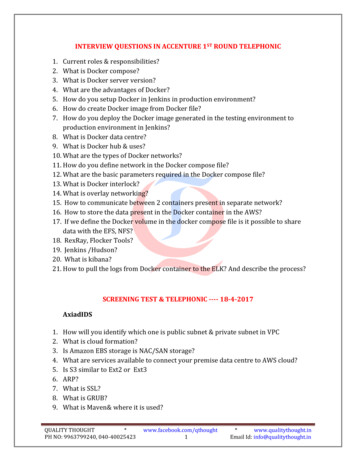
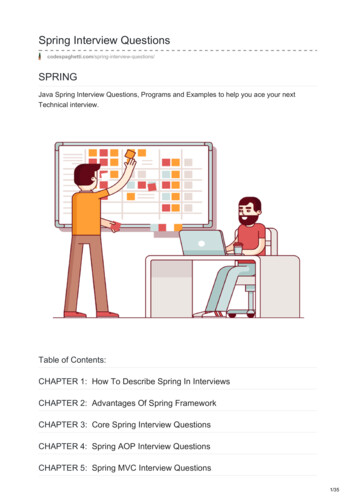
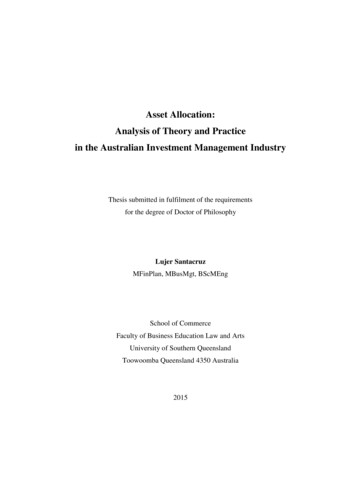
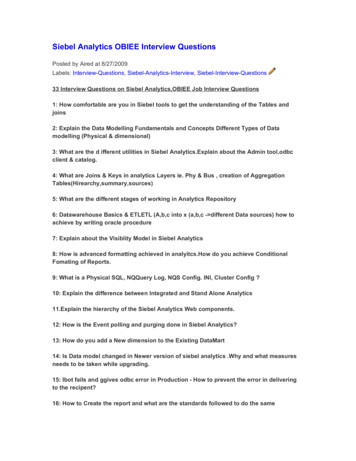
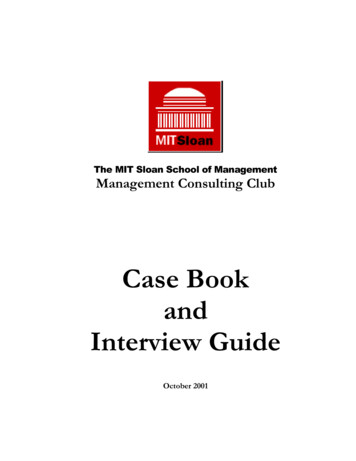
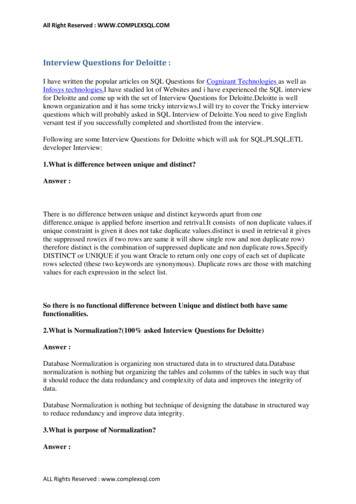
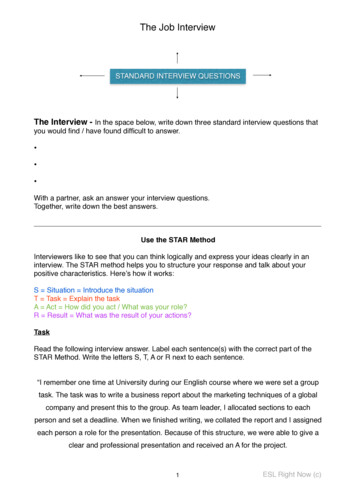
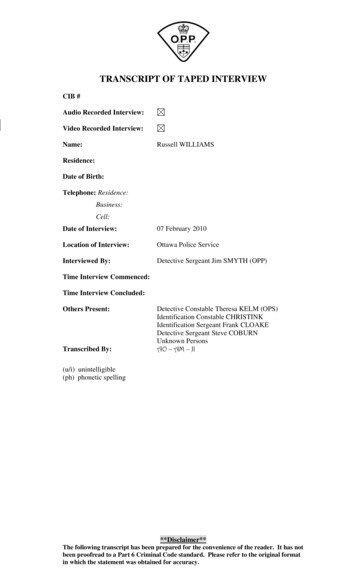
![Informatica Interview Questions and Answers [Scenario-Based]](/img/2/informatica-interview-questions-and-answers-scenario-based-1.jpg)
